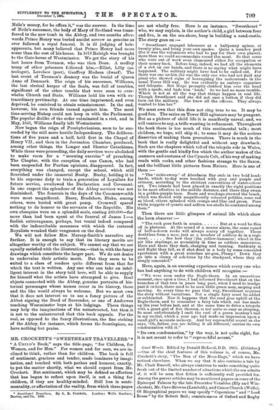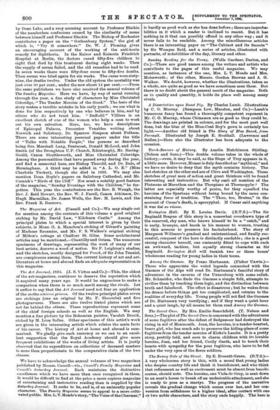Good Words. Edited by Donald McLeod, D.D. 1895. (Isbister.) —One
of the chief features of this volume is, of course, Mr. Crockett's stery, "The Men of the Moss-Hags," which we have noticed elsewhere. When we say that it also contains a tale by Mr. Clark Russell, who always contrives to make something quite fresh out of the limited number of situations which the sea admits of, it will be seen that fiction is sufficiently well provided for. Among the graver articles may be mentioned papers on some of the Episcopal Palaces by the late Precentor Venables (Ely and Win- chester), Mr. Cave-Browne (Lambeth), and Canon Church (Wells). Of Biographical papers we may specify " Copernicus " and " Lord Bosse" by Sir Robert Ball; reminiscences of Oxford and Rugby by Dean Lake, and a very amusing account by Professor Blaikie of the numberless confusions caused by the similarity of name between himself and Professor Blackie. The Bishop of Rochester contributes a paper on the "Gothenburg System," the gist of which is, "Try it somewhere." Dr. W. J. Fleming gives an encouraging account of the working of the anti-toxin remedy for diphtheria. In the Kaiser and Kaiserin Friedrich Hospital at Berlin, the doctors cured fifty-five children to eight that died by this treatment during eight weeks. Then the supply of serum failed, and the old remedies had to be used. In seven weeks there were fifty-four cures to fifty-five deaths. Then serum was tried again for six weeks. The cures were sixty- nine, the deaths twelve. Under the old system the mortality was just over 50 per cent., under the new about 14 per cent.—From the same publishers we have also received the annual volume of The Sunday Magazine. Here we have, by way of serial running through the year, a fine study of characters by Miss Christabel Coleridge, "The Tender Mercies of the Good." The hero of the story makes a terrible mistake in his early youth ; we see what is done for him respectively by one who believes in him, and by others who do not trust him. " Daffodil" Villiers is an excellent sketch of one of the women who help a man to work out his own salvation. Here, too, we have descriptions of Episcopal Palaces, Precentor Venables writing about Norwich and Salisbury, Dr. Sparrow Simpson about Fulham. There are some interesting personal papers under the title of "Talks with Notable People," the persons so described being Drs. Marshall Lang, Pentecost, Donald McLeod, and John Smith (of the Broughton U.P. Church, Edinburgh), Mr. Baring- Gould, Canon Shuttleworth, and Miss Christabel Coleridge. Among the personalities that have passed away during the year, and find a memorial here, are Bishop Thorold, and Dr. Dale, of Birmingham. A third may be added in "A. L. 0. E." (Miss Charlotte Tucker), though she died in 1893. We may also mention Dean Boyle's papers on Salisbury Cathedral, and Mr. Cornish's "Birds of the Cliff." Nor must a notably good feature of the magazine, "Sunday Evenings with the Children," be for- gotten. This year the contributors are the Rev. B. Waugh, the Rev. J. Reid Howatt, the Rev. W. J. Farell, Canon Atkinson, Dr. Hugh Macmillan, Dr. James Wells, the Rev. M. Lewis, and the Rev. Frank R. Burrows.























































 Previous page
Previous page